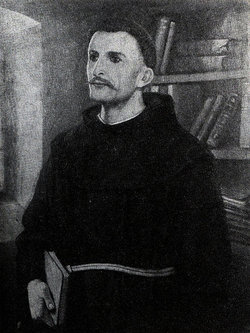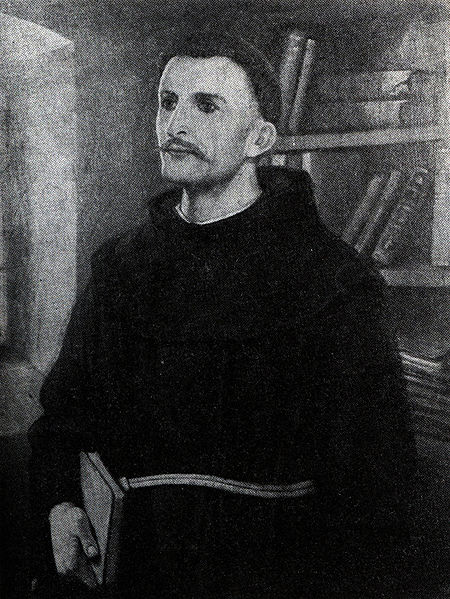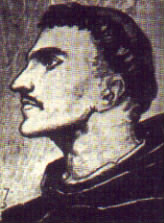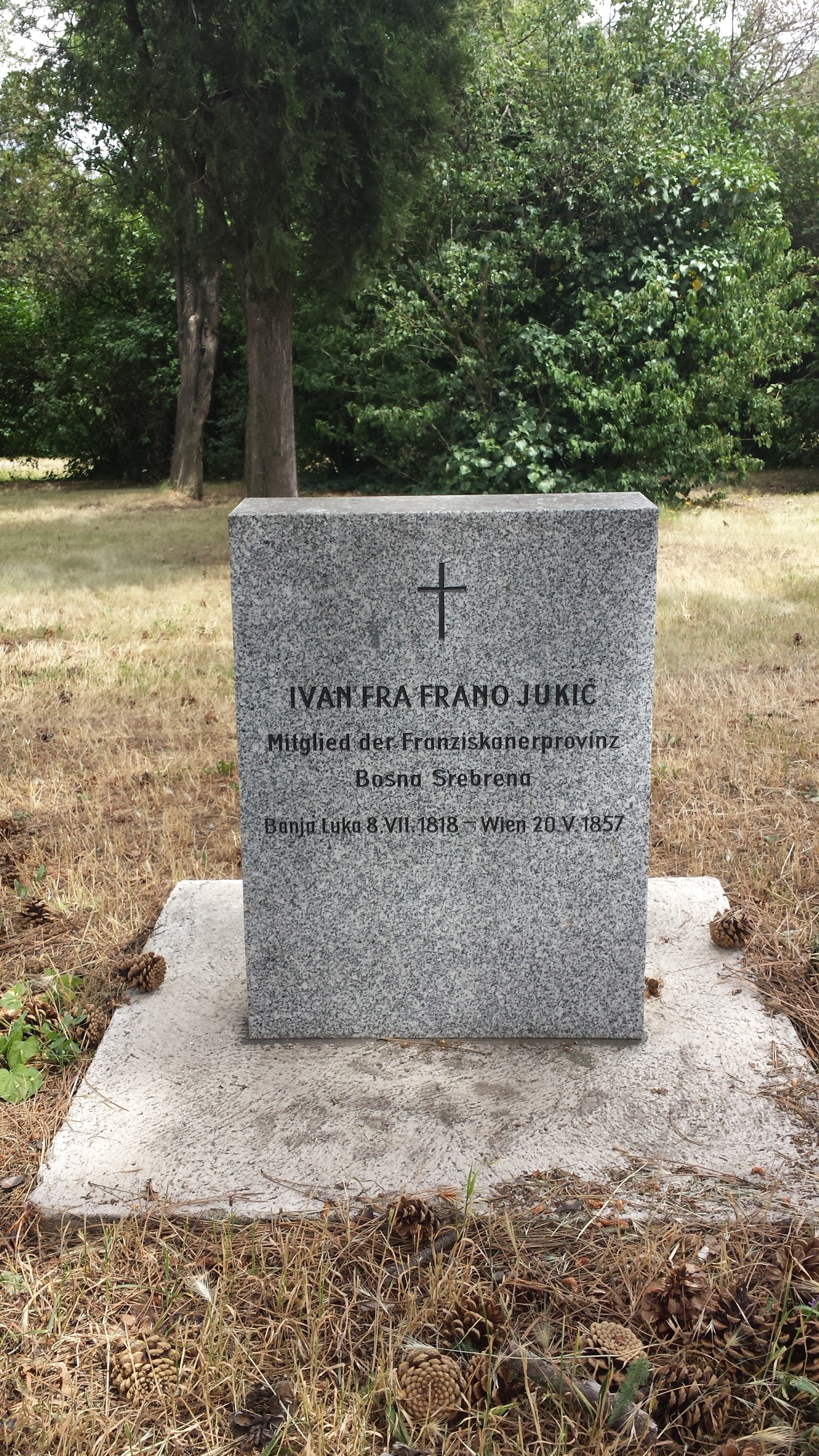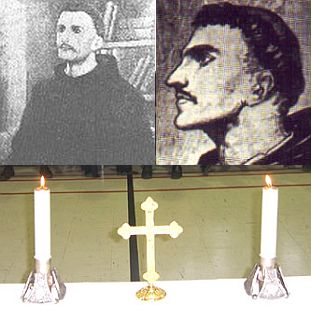Ivan Jukić was born in Banja Luka to the family of Jozo and Klara Jukić. In 1830, he was sent to the Franciscan Monastery in Fojnica, and was given the Monk name Frano. In 1835 he came to Zagreb where he studied philosophy and met the protagonists of the Illyrian movement. In 1837, he went to Veszprém to study theology, and from there he wrote his first songs and sent them to Ljudevit Gaj, whom he had previously met in Zagreb.
In Hungary Jukić met a certain Bosnian Serb trader called Jovanović, who convinced Jukić and three of his young friends that there is an uprising in the works to free Bosnia from the rule of the Ottoman Empire. This resulted in the four of them returning to Bosnia in 1840, in an effort to aid the effort, but as soon as they arrived, they were met by Fra Marijan Šunjić from Orašje, present day Ovčarevo, who told them that this idea was hopeless at the time, and sent them off to the Fojnica monastery with a letter recommending that the Franciscan Provincial finds them a refuge outside Bosnia. They were sent to Dubrovnik where they spent the next two years out of harms way.
In Dubrovnik, Jukić met Božidar Petranović, the editor of the Serb-Dalmatian magazine "Serbsko-dalmatinski magazine", who published Jukić's first books. In 1842 Friar Jukić returned to Bosnia and documented his trip, and made further trips around the country in 1843 as well as 1845, both to Bosnia and to Slavonia and Dalmatia. In 1846 he settled in the Fojnica monastery again for another two years, and also sent a letter to Ljudevit Gaj saying he intends to form a literary society aimed at enlightenment, but this never came into being.
In 1848, Jukić moved to Varcar-Vakuf in Mrkonjić Grad following his appointment as chaplain. Between 1849 and 1850, he reported to have thirty Catholic and seventeen Orthodox children in his school, making that the first school without religiously segregated student population in Bosnia. There he also wrote Slavodobitnica together with Fra Grga Martić, a song about the Bosnian governor Omer-Pasha Latas, whom he befriended.
However, in 1851, he published his proclamation "Requests and pleas of the Christians in Bosnia and Herzegovina", and fell out of favor with Omer-Pasha so much that he was banished to Istanbul and ordered never to return to his home country. Jukić then moved to Rome, then spent some time in Dalmatia, and then moved back to Rome, then to Ancona and Venice.
In 1854, he moved to Đakovo where Bishop Strossmayer found him a chapel to tend to in Trnava and Drenje. However, as early as 1856, Jukić became gravely ill and had to move to Vienna for medical treatment. Jukić's life was tragically cut short at the age of only 38, when he died in Vienna on May 20, 1857, shortly after undergoing an operation. His body was buried in a common grave at St. Marxer Friedhof and although at present a marker stands in his memory at the said cemetery, it does not mark his exact location as grave rearrangements through the years have since lost the exact whereabouts of his precise burial location.
Ivan Jukić was born in Banja Luka to the family of Jozo and Klara Jukić. In 1830, he was sent to the Franciscan Monastery in Fojnica, and was given the Monk name Frano. In 1835 he came to Zagreb where he studied philosophy and met the protagonists of the Illyrian movement. In 1837, he went to Veszprém to study theology, and from there he wrote his first songs and sent them to Ljudevit Gaj, whom he had previously met in Zagreb.
In Hungary Jukić met a certain Bosnian Serb trader called Jovanović, who convinced Jukić and three of his young friends that there is an uprising in the works to free Bosnia from the rule of the Ottoman Empire. This resulted in the four of them returning to Bosnia in 1840, in an effort to aid the effort, but as soon as they arrived, they were met by Fra Marijan Šunjić from Orašje, present day Ovčarevo, who told them that this idea was hopeless at the time, and sent them off to the Fojnica monastery with a letter recommending that the Franciscan Provincial finds them a refuge outside Bosnia. They were sent to Dubrovnik where they spent the next two years out of harms way.
In Dubrovnik, Jukić met Božidar Petranović, the editor of the Serb-Dalmatian magazine "Serbsko-dalmatinski magazine", who published Jukić's first books. In 1842 Friar Jukić returned to Bosnia and documented his trip, and made further trips around the country in 1843 as well as 1845, both to Bosnia and to Slavonia and Dalmatia. In 1846 he settled in the Fojnica monastery again for another two years, and also sent a letter to Ljudevit Gaj saying he intends to form a literary society aimed at enlightenment, but this never came into being.
In 1848, Jukić moved to Varcar-Vakuf in Mrkonjić Grad following his appointment as chaplain. Between 1849 and 1850, he reported to have thirty Catholic and seventeen Orthodox children in his school, making that the first school without religiously segregated student population in Bosnia. There he also wrote Slavodobitnica together with Fra Grga Martić, a song about the Bosnian governor Omer-Pasha Latas, whom he befriended.
However, in 1851, he published his proclamation "Requests and pleas of the Christians in Bosnia and Herzegovina", and fell out of favor with Omer-Pasha so much that he was banished to Istanbul and ordered never to return to his home country. Jukić then moved to Rome, then spent some time in Dalmatia, and then moved back to Rome, then to Ancona and Venice.
In 1854, he moved to Đakovo where Bishop Strossmayer found him a chapel to tend to in Trnava and Drenje. However, as early as 1856, Jukić became gravely ill and had to move to Vienna for medical treatment. Jukić's life was tragically cut short at the age of only 38, when he died in Vienna on May 20, 1857, shortly after undergoing an operation. His body was buried in a common grave at St. Marxer Friedhof and although at present a marker stands in his memory at the said cemetery, it does not mark his exact location as grave rearrangements through the years have since lost the exact whereabouts of his precise burial location.
Advertisement
Explore more
Sponsored by Ancestry
Advertisement
